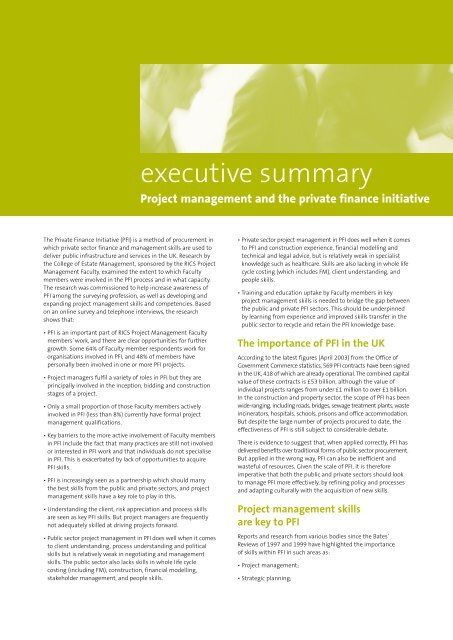Project management and the private finance initiative
Project management and the private finance initiative
Project management and the private finance initiative
Create successful ePaper yourself
Turn your PDF publications into a flip-book with our unique Google optimized e-Paper software.
The Private Finance Initiative (PFI) is a method of procurement in<br />
which <strong>private</strong> sector <strong>finance</strong> <strong>and</strong> <strong>management</strong> skills are used to<br />
deliver public infrastructure <strong>and</strong> services in <strong>the</strong> UK. Research by<br />
<strong>the</strong> College of Estate Management, sponsored by <strong>the</strong> RICS <strong>Project</strong><br />
Management Faculty, examined <strong>the</strong> extent to which Faculty<br />
members were involved in <strong>the</strong> PFI process <strong>and</strong> in what capacity.<br />
The research was commissioned to help increase awareness of<br />
PFI among <strong>the</strong> surveying profession, as well as developing <strong>and</strong><br />
exp<strong>and</strong>ing project <strong>management</strong> skills <strong>and</strong> competencies. Based<br />
on an online survey <strong>and</strong> telephone interviews, <strong>the</strong> research<br />
shows that:<br />
• PFI is an important part of RICS <strong>Project</strong> Management Faculty<br />
members’ work, <strong>and</strong> <strong>the</strong>re are clear opportunities for fur<strong>the</strong>r<br />
growth. Some 64% of Faculty member respondents work for<br />
organisations involved in PFI, <strong>and</strong> 48% of members have<br />
personally been involved in one or more PFI projects.<br />
• <strong>Project</strong> managers fulfil a variety of roles in PFI but <strong>the</strong>y are<br />
principally involved in <strong>the</strong> inception, bidding <strong>and</strong> construction<br />
stages of a project.<br />
• Only a small proportion of those Faculty members actively<br />
involved in PFI (less than 8%) currently have formal project<br />
<strong>management</strong> qualifications.<br />
• Key barriers to <strong>the</strong> more active involvement of Faculty members<br />
in PFI include <strong>the</strong> fact that many practices are still not involved<br />
or interested in PFI work <strong>and</strong> that individuals do not specialise<br />
in PFI. This is exacerbated by lack of opportunities to acquire<br />
PFI skills.<br />
• PFI is increasingly seen as a partnership which should marry<br />
<strong>the</strong> best skills from <strong>the</strong> public <strong>and</strong> <strong>private</strong> sectors, <strong>and</strong> project<br />
<strong>management</strong> skills have a key role to play in this.<br />
• Underst<strong>and</strong>ing <strong>the</strong> client, risk appreciation <strong>and</strong> process skills<br />
are seen as key PFI skills. But project managers are frequently<br />
not adequately skilled at driving projects forward.<br />
• Public sector project <strong>management</strong> in PFI does well when it comes<br />
to client underst<strong>and</strong>ing, process underst<strong>and</strong>ing <strong>and</strong> political<br />
skills but is relatively weak in negotiating <strong>and</strong> <strong>management</strong><br />
skills. The public sector also lacks skills in whole life cycle<br />
costing (including FM), construction, financial modelling,<br />
stakeholder <strong>management</strong>, <strong>and</strong> people skills.<br />
executive summary<br />
<strong>Project</strong> <strong>management</strong> <strong>and</strong> <strong>the</strong> <strong>private</strong> <strong>finance</strong> <strong>initiative</strong><br />
• Private sector project <strong>management</strong> in PFI does well when it comes<br />
to PFI <strong>and</strong> construction experience, financial modelling <strong>and</strong><br />
technical <strong>and</strong> legal advice, but is relatively weak in specialist<br />
knowledge such as healthcare. Skills are also lacking in whole life<br />
cycle costing (which includes FM), client underst<strong>and</strong>ing, <strong>and</strong><br />
people skills.<br />
• Training <strong>and</strong> education uptake by Faculty members in key<br />
project <strong>management</strong> skills is needed to bridge <strong>the</strong> gap between<br />
<strong>the</strong> public <strong>and</strong> <strong>private</strong> PFI sectors. This should be underpinned<br />
by learning from experience <strong>and</strong> improved skills transfer in <strong>the</strong><br />
public sector to recycle <strong>and</strong> retain <strong>the</strong> PFI knowledge base.<br />
The importance of PFI in <strong>the</strong> UK<br />
According to <strong>the</strong> latest figures (April 2003) from <strong>the</strong> Office of<br />
Government Commerce statistics, 569 PFI contracts have been signed<br />
in <strong>the</strong> UK, 418 of which are already operational. The combined capital<br />
value of <strong>the</strong>se contracts is £53 billion, although <strong>the</strong> value of<br />
individual projects ranges from under £1 million to over £1 billion.<br />
In <strong>the</strong> construction <strong>and</strong> property sector, <strong>the</strong> scope of PFI has been<br />
wide-ranging, including roads, bridges, sewage treatment plants, waste<br />
incinerators, hospitals, schools, prisons <strong>and</strong> office accommodation.<br />
But despite <strong>the</strong> large number of projects procured to date, <strong>the</strong><br />
effectiveness of PFI is still subject to considerable debate.<br />
There is evidence to suggest that, when applied correctly, PFI has<br />
delivered benefits over traditional forms of public sector procurement.<br />
But applied in <strong>the</strong> wrong way, PFI can also be inefficient <strong>and</strong><br />
wasteful of resources. Given <strong>the</strong> scale of PFI, it is <strong>the</strong>refore<br />
imperative that both <strong>the</strong> public <strong>and</strong> <strong>private</strong> sectors should look<br />
to manage PFI more effectively, by refining policy <strong>and</strong> processes<br />
<strong>and</strong> adapting culturally with <strong>the</strong> acquisition of new skills.<br />
<strong>Project</strong> <strong>management</strong> skills<br />
are key to PFI<br />
Reports <strong>and</strong> research from various bodies since <strong>the</strong> Bates’<br />
Reviews of 1997 <strong>and</strong> 1999 have highlighted <strong>the</strong> importance<br />
of skills within PFI in such areas as:<br />
• <strong>Project</strong> <strong>management</strong>;<br />
• Strategic planning;

















